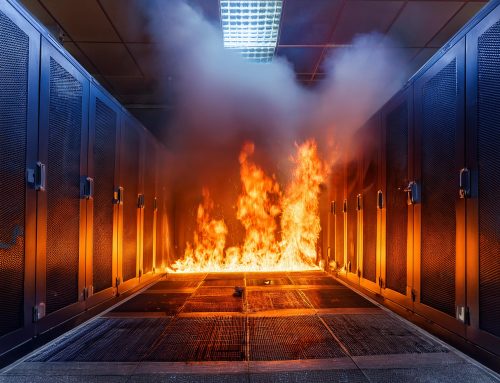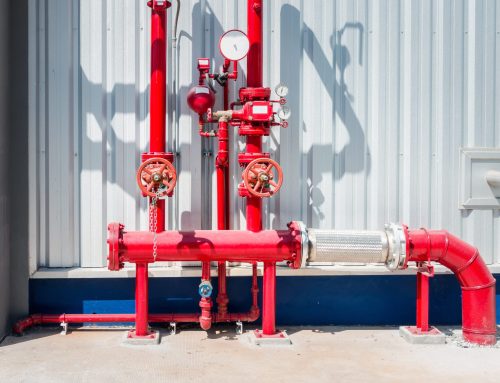If your fire sprinkler system is leaking, it is vital to make sure there is no active fire triggering your sprinkler system to discharge. Once certain there is no fire hazard in your facility, call your fire protection company and be ready to share as many details about the leak as possible. These details will help give your fire protection technician an idea of what to expect during their visit and repair.
Why leaks occur
Fire sprinkler systems are prone to corrosion, damage, equipment failure, and freezing temperatures.
Corrosion
Corrosion causes rust spots, creating holes in piping and/or sprinkler heads. It can occur in both wet and dry pipe sprinkler systems. One cause of corrosion is due to sprinkler systems’ exposure to oxygen. Another is Microbiologically Influenced Corrosion, or MIC. MIC is an aggressive, accelerated type of corrosion caused by bacteria.
Damage
Sprinkler systems can also become damaged accidentally by forklifts, ladders, equipment, etc., as well as intentionally as an act of vandalism.
Equipment failure
Equipment failure in sprinkler systems can occur by manufacturing or human installation errors. Routine wear and tear can cause sprinkler systems to leak if not regularly maintained. Another common malfunction that causes fire sprinkler systems to leak involves o-ring seals and contaminants in the water, causing them to corrode and leak. Overtightening sprinkler heads or fittings can cause leaks.
Freezing temperatures
Pipes freezing is another common cause of leaking in wet pipe fire sprinkler systems, and it is less common in dry pipe and preaction sprinkler systems, as they do not hold a constant water supply.
What to do if you discover a leak
As soon as you discover a leak in your fire sprinkler system, attempt to identify why it is leaking and whether or not it’s necessary to evacuate the building. Water can cause electrical components to short-circuit or even ignite, causing a fire in your facility.
If a large amount of water is pouring out of your system, turning off the facility’s water supply may be necessary to avoid water damage. Even if you only see water drips, it’s good to check your pressure gauges against manufacturer recommendations to see if there may be other leaks in the piping circuit.
Once you have investigated the source of the leak and, if necessary, evacuated the building and turned off the water supply, it’s time to call your fire suppression company. Be ready to share as many details about the leak as possible.
Repairs you might expect
If the leak in your fire sprinkler system is due to corroded or burst pipes, either a portion or the entirety of the piping system may need replacement. Some corrosion may be external and easy to spot. However, corrosion often occurs inside the pipes and can only be seen by a professional with an internal camera. Corroded sprinkler heads will likely need replacing.
If your leak occurred due to external physical damage, the damaged component would be repaired/replaced, and a protective cage may be installed to prevent future bumps/tampering. If the leak is due to corroded pipes, either a portion or the entirety of the piping system may have to be entirely replaced.
If the leak is due to equipment failure, the component in question will likely need to be replaced/reinstalled by a professional.
Ways to prevent future leaks
The easiest way to prevent future leaks in your fire sprinkler system is to hire a fire protection company that you trust. Your fire protection company will work with you to ensure your sprinkler system is regularly maintained according to the National Fire Protection Agency’s NFPA 25: Standard for the Inspection, Testing, and Maintenance of Water-Based Fire Protection Systems. Maintenance according to this standard will help prevent any future leaks from occurring.
Consider Fire Systems, Inc.
Atlanta-based Fire Systems, Inc has been in the business of fire protection since 1986. Our highly trained technicians are prepared to repair any leaks present in your fire sprinkler system. After repairs are done, we’ll work with you to set up a regular maintenance schedule to avoid any leaks or other issues in the future.
Give us a call at 770-333-7979 or visit our website today.






